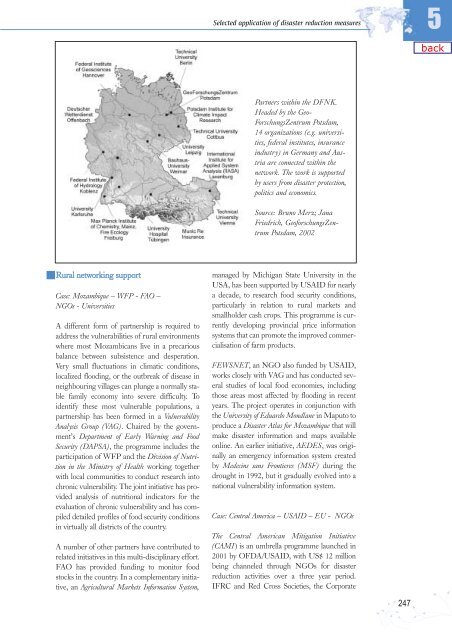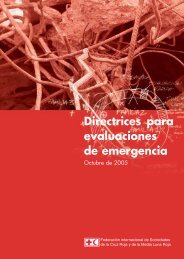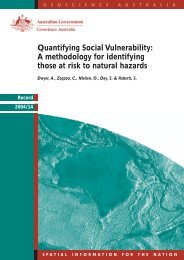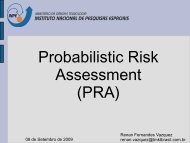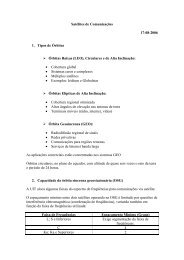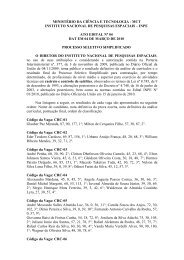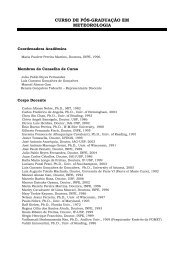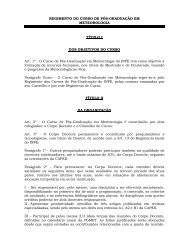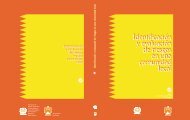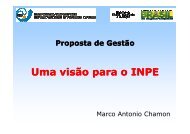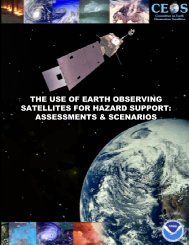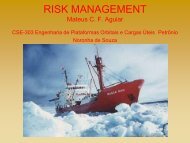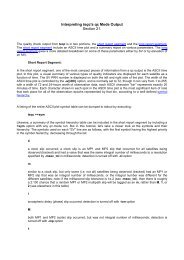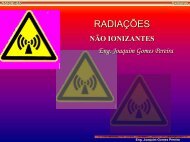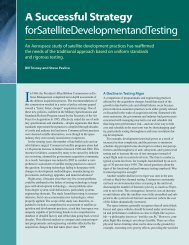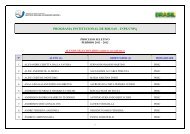Living with Risk. A global review of disaster reduction initiatives
Living with Risk. A global review of disaster reduction initiatives
Living with Risk. A global review of disaster reduction initiatives
Create successful ePaper yourself
Turn your PDF publications into a flip-book with our unique Google optimized e-Paper software.
Selected application <strong>of</strong> <strong>disaster</strong> <strong>reduction</strong> measures<br />
5<br />
Partners <strong>with</strong>in the DFNK.<br />
Headed by the Geo-<br />
ForschungsZentrum Potsdam,<br />
14 organizations (e.g. universities,<br />
federal institutes, insurance<br />
industry) in Germany and Austria<br />
are connected <strong>with</strong>in the<br />
network. The work is supported<br />
by users from <strong>disaster</strong> protection,<br />
politics and economics.<br />
Source: Bruno Merz; Jana<br />
Friedrich, Ge<strong>of</strong>orschungsZentrum<br />
Potsdam, 2002<br />
Rural networking support<br />
Case: Mozambique – WFP - FAO –<br />
NGOs - Universities<br />
A different form <strong>of</strong> partnership is required to<br />
address the vulnerabilities <strong>of</strong> rural environments<br />
where most Mozambicans live in a precarious<br />
balance between subsistence and desperation.<br />
Very small fluctuations in climatic conditions,<br />
localized flooding, or the outbreak <strong>of</strong> disease in<br />
neighbouring villages can plunge a normally stable<br />
family economy into severe difficulty. To<br />
identify these most vulnerable populations, a<br />
partnership has been formed in a Vulnerability<br />
Analysis Group (VAG). Chaired by the government’s<br />
Department <strong>of</strong> Early Warning and Food<br />
Security (DAPSA), the programme includes the<br />
participation <strong>of</strong> WFP and the Division <strong>of</strong> Nutrition<br />
in the Ministry <strong>of</strong> Health working together<br />
<strong>with</strong> local communities to conduct research into<br />
chronic vulnerability. The joint initiative has provided<br />
analysis <strong>of</strong> nutritional indicators for the<br />
evaluation <strong>of</strong> chronic vulnerability and has compiled<br />
detailed pr<strong>of</strong>iles <strong>of</strong> food security conditions<br />
in virtually all districts <strong>of</strong> the country.<br />
A number <strong>of</strong> other partners have contributed to<br />
related <strong>initiatives</strong> in this multi-disciplinary effort.<br />
FAO has provided funding to monitor food<br />
stocks in the country. In a complementary initiative,<br />
an Agricultural Markets Information System,<br />
managed by Michigan State University in the<br />
USA, has been supported by USAID for nearly<br />
a decade, to research food security conditions,<br />
particularly in relation to rural markets and<br />
smallholder cash crops. This programme is currently<br />
developing provincial price information<br />
systems that can promote the improved commercialisation<br />
<strong>of</strong> farm products.<br />
FEWSNET, an NGO also funded by USAID,<br />
works closely <strong>with</strong> VAG and has conducted several<br />
studies <strong>of</strong> local food economies, including<br />
those areas most affected by flooding in recent<br />
years. The project operates in conjunction <strong>with</strong><br />
the University <strong>of</strong> Eduardo Mondlane in Maputo to<br />
produce a Disaster Atlas for Mozambique that will<br />
make <strong>disaster</strong> information and maps available<br />
online. An earlier initiative, AEDES, was originally<br />
an emergency information system created<br />
by Medecins sans Frontieres (MSF) during the<br />
drought in 1992, but it gradually evolved into a<br />
national vulnerability information system.<br />
Case: Central America – USAID – EU - NGOs<br />
The Central American Mitigation Initiative<br />
(CAMI) is an umbrella programme launched in<br />
2001 by OFDA/USAID, <strong>with</strong> US$ 12 million<br />
being channeled through NGOs for <strong>disaster</strong><br />
<strong>reduction</strong> activities over a three year period.<br />
IFRC and Red Cross Societies, the Corporate<br />
247


